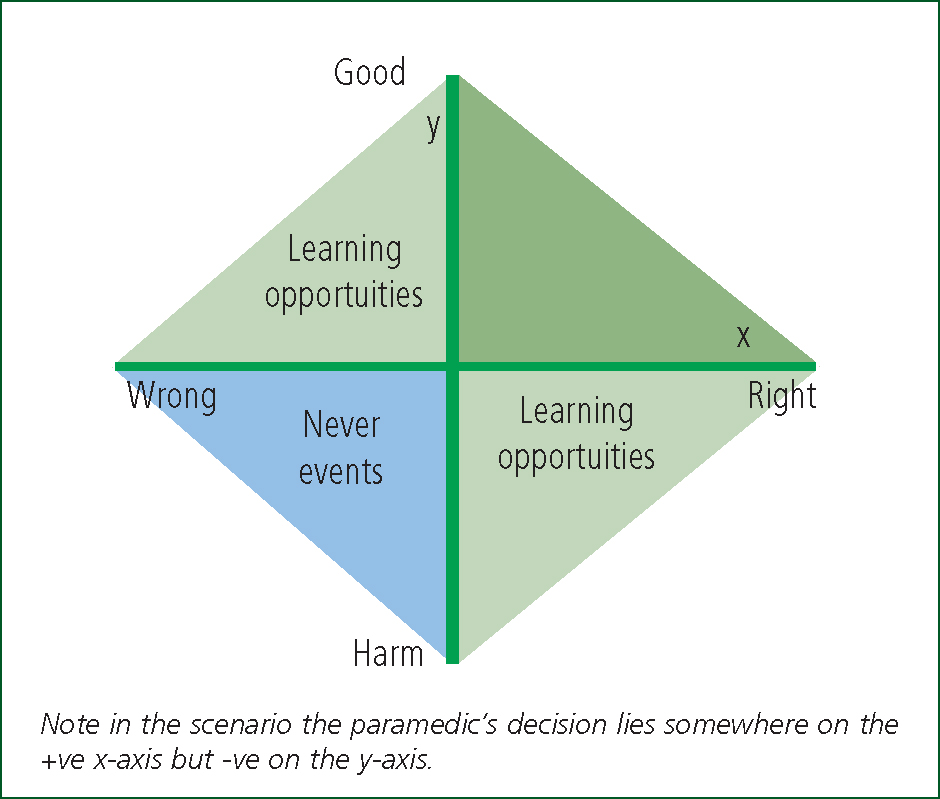An 85-year-old named Anne, who has known vestibular issues, tripped on a door threshold resulting in a floor time of 3 hours. Remarkably, there are only minor injuries with normal examination aside from an elevated heart rate of 96 beats per minute (bpm). Concerned about rhabdomyolysis due to floor time, the paramedic crew decides to convey her to the hospital to monitor her creatine kinase level.
Is this the right decision?
Despite the creatine kinase and other blood tests being normal, Anne subsequently contracts pneumonia resulting in a month's stay in hospital. Upon her return home, Anne no longer feels she can leave home due to a combination of anxiety and loss of muscle mass from her experience.
To what extent was the paramedic's decision a good one?
The purpose of this scenario is two-fold. Firstly, paramedic practice is about managing uncertainty; the first paragraph likely makes logical sense, even when arguing an alternative decision such as staying at home with monitoring, it is difficult to ascertain what the consequence will be. However, with knowledge of the overall consequence, this decision may shift from being a good one to a bad one, with resultant reconsideration that the initial action may have in fact been the wrong one. Furthermore, what is the impact on the following elderly faller the paramedic encounters? Would that decision be the same or completely different?
For centuries, ethicists have argued the meaning of right and wrong, good and bad, the motivations behind actions and, ultimately, the consequences. This article—the second in the series—briefly examines the relationship between good and right in paramedic practice, challenging existing theories with an aim to conceptually improve ethical decision-making.
Doing the right thing
According to Scanlon (1998), perhaps the easiest means to identify what constitutes a right act is to know what a wrong one is. This was discussed in the previous article. As a reminder, it regards acting in a justified manner that others could not reasonably reject. However, being right has many permutations: it was not wrong to convey Anne to hospital because there was a justified concern, just as it would not be wrong to have left Anne at home.
According to Ross (2002), to be right is multifactorial, requiring a combination of primafacie principles such as non-maleficence, fidelity, beneficence and gratitude. This construct is similar, and perhaps more familiar for paramedics, to Beauchamp and Childress’ (2020) four principles (beneficence, autonomy, non-maleficence and justice) framework, which stems from duties to uphold (Deontology). Importantly, the four principles serve as a guide, and might not represent the full range of principles clinicians use. Further, evidence is lacking among health professionals regarding whether these principles are adopted in practice. For instance, Page (2012) noted that psychology students valued non-maleficence twice as much as any other principle. For paramedics, existing research implies that beneficence is intuitively the dominant principle (Nordby and Nöhr, 2012; Braithwaite, 2014; Nordby, 2014; Rees et al, 2017).
One explanation behind this phenomenon is that when principles conflict, there often has to be an ‘absolute’ duty that takes precedence over others. In bioethics, autonomy is often cited as this principle, since it retains respect, dignity and limits paternalism (Erbay et al, 2010; Coggon and Miola, 2011; Gillon, 2015). For Ross (2002) however, the prevailing principle needs to be assessed on a case-by-case basis, and this might be why certain professions view principles in higher esteem. Paramedics encounter individuals where autonomy is compromised (or tacitly agree with the paramedic), and therefore it may be that beneficence is observed more frequently than any other principle.

Rightness to paramedics then is about using a set of principles to justify an action that others would not reasonably reject. Is behaving in this manner sufficient enough that each outcome will be a good one?
Doing good
Utilitarianism is known for stipulating that any moral action is considered good (measured as the sum of happiness and wellbeing) so long as the consequences yield the greatest benefit (Bentham and Mill, 2004). Kagan (1998), however, illustrates that the issue behind utilitarianism is that uncertainty renders it difficult to ensure that the action will provide the best consequence. Since paramedic practice is laden with uncertainty, consequentialism is a poor measure of doing good actions at the time of the patient encounter. Indeed, good actions require balancing out risks and harm, to provide weight to a decision (Beauchamp and Childress, 2020). Therefore, paramedics ought to always consider what harm may be caused in either:
This can be achieved predominantly by following guidelines and the evidence base, and sharing decisions. In the initial scenario, it could be argued that hospital admission conveys greater risk than staying at home with safety netting and advice on a follow-up with primary care, as illustrated by Devlin's (2021) excellent article on falls and rhabdomyolysis.
However, a weakness of balanced decisions is that it relies on some degree of evidence, knowledge or experience to help justify an action—the former of which is lacking in paramedic science (albeit a growing research field. The latter relies upon a degree of feedback that enables reinforcement of good decisions and learning from poor ones, also left wanting in paramedic practice (Morrison et al, 2017; Eaton-Williams et al, 2020). Hence, in uncertainty, the default option with the least apparent risk will prevail, which in paramedic practice would be to hand over the patient to a medical expert, typically at hospital (Iserson et al, 1995).
Certainly, in England, the NHS plans to reduce ambulance conveyance rates and, in turn, hospital demand (NHS England, 2019). To minimise variability requires paramedics to feel more secure and supported in their decisions to non-convey (O'Cathain et al, 2018).
However, there is no easy solution to managing uncertainty and to being reassured that decisions will likely have good outcomes, other than to increase the evidence-base, clinician knowledge and experience. For paramedics, this requires reflective practice, research, and designing systems to provide feedback. Moreover, it would be unfair to expect paramedics to consider long-term implications simply due to uncertainty. Equally, it is unreasonable for paramedics to use uncertainty as a means to justify overly precautionary actions, particularly if these areas offer an opportunity to be improved upon, both individually and as a profession.
To be right and good
Arguably, the construct of good and right are so intrinsically linked that it is impossible to make right decisions without having some inclination (at least intuitive) or intention to yield a good outcome (e.g. patient survives, referred to correct care pathway, improved quality of life). Likewise, without learning from good (or poor) outcomes, it is unlikely that new values or wisdom will be fostered to help provide a basis for right decisions in the future (Figure 1).

In this respect, Scanlon's contractualism presents a compelling argument that supports principles such as candor, fidelity and beneficence, in promoting the wellbeing of others. For instance, although uncertainty is not discussed by Scanlon (1998), the action of a paramedic admitting uncertainty, but assuring Anne that her condition is stable and that she will be followed up by a senior clinician (not necessarily on the same day) would be a reasonable and justifiable action. Likewise, should the paramedic reflect and learn more about falls and rhabdomyolysis, future encounters may use a different set of principles, such that Anne is warned of rhabdomyolysis symptoms and to contact a health professional should they arise.
Conclusion
To draw this article to a close, I would argue that to be right and good is to make a decision based on as much information that can be drawn upon during the situation at the time, and use principles to justify an action that others could not reasonably reject. This encompasses the evidence base, guidelines, clinician knowledge and experience, time constraints, and patient needs.
Importantly, our understanding of paramedic principles is limited. Prima-facie literally means at first sight, whereas many additional principles operate as part of our moral being that likely influence decisions at a much greater level than our initial impression of do good, cause minimal harm, respect autonomy and be just and fair. It requires research, learning, feedback, experience and reflection to uncover these, both for ourselves and for the paramedic profession on a whole.
The following article will explore distributive justice, discussing what it means to be good (in a skilful sense), efficient and valuable as a clinician within the wider health system.

